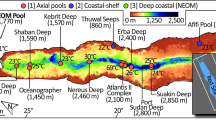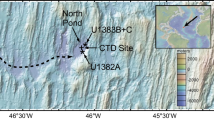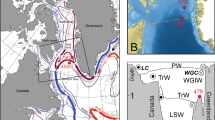Abstract
THE bathymetric and hydrographic data from the expedition of the R/V Chain during November 1966 revealed three deeps in the Red Sea all containing hot brine1. The largest of these, the Atlantis II deep, contained bottom water at 56.5° C and with salinity 257‰, above which was an intermediate layer at 44.3° C and salinity 135‰. The two adjacent deeps (Discovery deep and Chain deep) contain brine at a lower temperature and it has been suggested that these represent spillover from the active site1.
This is a preview of subscription content, access via your institution
Access options
Subscribe to this journal
Receive 51 print issues and online access
$199.00 per year
only $3.90 per issue
Buy this article
- Purchase on Springer Link
- Instant access to full article PDF
Prices may be subject to local taxes which are calculated during checkout
Similar content being viewed by others
References
Degens, E. T., and Ross, D. A., Hot Brines and Recent Heavy Metal Deposits in the Red Sea (edit. by Degens, E. T., and Ross, D. A.), 600 (Springer, New York, 1969).
Munns, R. G., Stanley, R. J., and Densmore, C. D., Nature, 214, 1215 (1967).
Brewer, P. G., Densmore, C. D., Munns, R. G., and Stanley, R. J., in Hot Brines and Recent Heavy Metal Deposits in the Red Sea (edit. by Degens, E. T., and Ross, D. A.), 138 (Springer, New York, 1969).
Ross, D. A., and Hunt, J. M., Nature, 213, 687 (1967).
Ross, D. A., Hays, E. E., and Allstrom, F. C., in Hot Brines and Recent Heavy Metal Deposits in the Red Sea (edit. by Degens, E. T., and Ross, D. A.), 83 (Springer, New York, 1969).
Swallow, J. C., in Hot Brines and Recent Heavy Metal Deposits in the Red Sea (edit. by Degens, E. T., and Ross, D. A.), 3 (Springer, New York, 1969).
Ross, D. A., in Hot Brines and Recent Heavy Metal Deposits in the Red Sea (edit. by Degens, E. T., and Ross, D. A.), 148 (Springer, New York, 1969).
Gucker, jun., F. T., and Rubin, T. R., J. Amer. Chem. Soc., 57, 78 (1935).
Bromley, L. A., Gillan, W. S., and Coley, F. H., J. Chem. Eng. Data, 12, 202 (1967).
Erickson, A. J., and Simmons, G., in Hot Brines and Recent Heavy Metal Deposits in the Red Sea (edit. by Degens, E. T., and Ross, D. A.), 114 (Springer, New York, 1969).
Pugh, D. T., in Hot Brines and Recent Heavy Metal Deposits in the Red Sea (edit. by Degens, E. T., and Ross, D. A.), 158 (Springer, New York, 1969).
Miller, A. R., Densmore, C. D., Degens, E. T., Hathaway, jun., C., Manheim, F. G., McFarlin, P. F., Pocklington, R., and Jokela, A., Geochim. Cosmochim. Acta, 30, 341 (1966).
Brewer, P. G., and Spencer, D. W., in Hot Brines and Recent Heavy Metal Deposits in the Red Sea (edit. by Degens, E. T., and Ross, D. A.), 174 (Springer, New York, 1969).
Author information
Authors and Affiliations
Rights and permissions
About this article
Cite this article
BREWER, P., WILSON, T., MURRAY, J. et al. Hydrographic Observations on the Red Sea Brines indicate a Marked Increase in Temperature. Nature 231, 37–38 (1971). https://doi.org/10.1038/231037a0
Received:
Issue Date:
DOI: https://doi.org/10.1038/231037a0
Comments
By submitting a comment you agree to abide by our Terms and Community Guidelines. If you find something abusive or that does not comply with our terms or guidelines please flag it as inappropriate.



